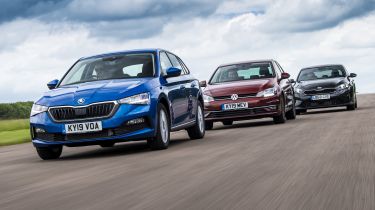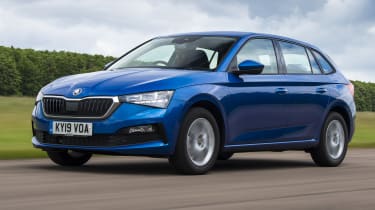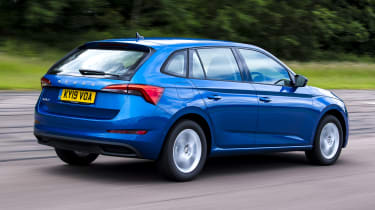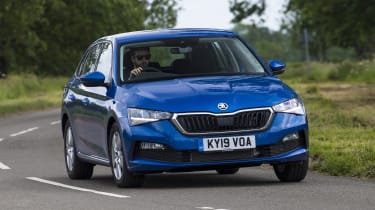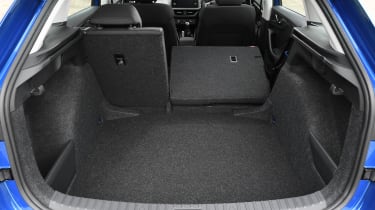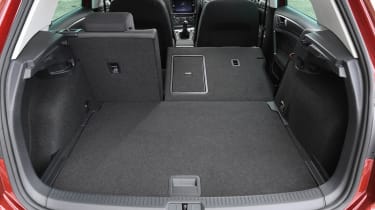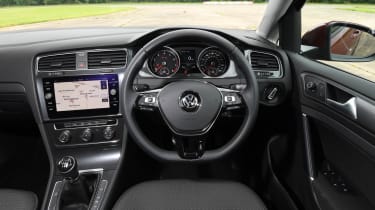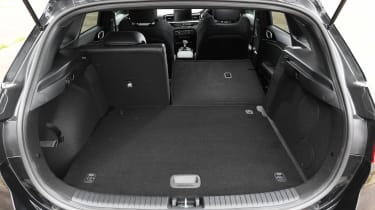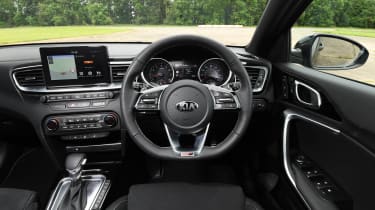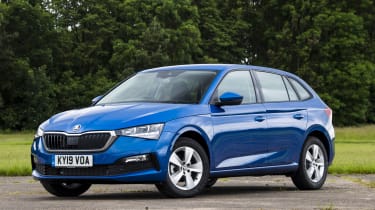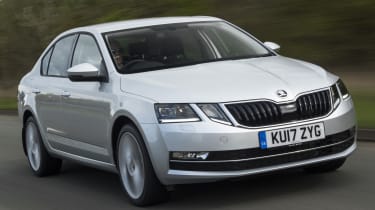Skoda Scala vs Volkswagen Golf vs Kia Ceed
We find out if the all-new Skoda Scala hatch can hold its own against the Volkswagen Golf and Kia Ceed
A new family hatch is always big news, given that these are among the most popular types of car with British buyers. UK motorists love the mix of ability that a good hatchback can provide, and any car worth its salt in this class has to be practical, good to drive, affordable and cheap to run.
A new Skoda hatchback is even bigger news, though, because the brand’s new Scala promises to shake up the segment.
• Best hatchbacks you can buy 2019
It’s an even stronger value proposition than the brand’s Octavia, yet the Scala doesn’t compromise when it comes to engineering or ability, or at least that’s what we’re hoping to find out. It’s an all-new model that’s been engineered to compete with the best in the class, but when it comes to talent there are a number of models in this sector that mean the Scala has a challenge to rise to the top.
In our test we’ll find out if the Czech newcomer can achieve this, and whether it can beat the car that has dominated the hatchback class since 2012: the Volkswagen Golf. The latest Kia Ceed is also a strong challenger, because this all-new model is the best version yet, and pushes the VW in many areas.
Skoda Scala
| Model: | Skoda Scala 1.0 TSI 115 SE |
| Price: | £18,585 |
| Engine: | 1.0-litre 3cyl petrol, 113bhp |
| 0-60mph: | 9.7 seconds |
| Test economy: | 54.7mpg/12.0mpl |
| CO2: | 113g/km |
| Annual road tax: | £145 |
Skoda has a reputation for building great-value cars, so here we’re testing the most affordable model in the Scala range: the 1.0-litre turbo petrol, with 113bhp and a manual gearbox, in SE trim. It’s the cheapest car here, at £18,585.
Design & engineering
The Scala is an all-new model, and as you’d expect of any fresh product from a VW Group brand, it’s based on architecture shared with plenty of other cars. In this case it’s the MQB A0 platform. This is an evolution of the architecture that underpins the VW Golf (and the Skoda Octavia), but the A0 denotation means it’s the version generally used for superminis. So the Scala is based on the same platform as the Polo rather than the Golf that it rivals, but this doesn’t affect its ability.
Used - available now

2023 Skoda
Scala
14,436 milesManualPetrol1.5L
Cash £13,283
2020 Skoda
Scala
13,395 milesManualPetrol1.0L
Cash £11,900
2023 Skoda
Scala
51,983 milesManualPetrol1.0L
Cash £13,387
2023 Skoda
Scala
10,990 milesAutomaticPetrol1.0L
Cash £16,087It has MacPherson struts at the front and a torsion beam at the back, which is the same as the Volkswagen in this specification; larger-engined Golfs have a multi-link set-up. However, every version of the Ceed uses the more complex multi-link arrangement.
The Scala shares its 1.0-litre petrol engine with the Golf here, so both have 113bhp and 200Nm of torque, and feature a six-speed manual gearbox.
Inside, the Skoda is great, considering that we’re looking at entry-level models in this test. Build quality is solid, and there’s enough soft-touch plastic in the right places to ensure it doesn’t feel as budget as the price tag suggests. Its simple design means the Scala is easy to live with, and the seats are comfy. It’s marginally less plush than the Golf, but not by much, and the Kia has more hard plastic than its rivals here.
An eight-inch touchscreen display with Android Auto and Apple CarPlay is standard on the Scala, which is excellent and adds to the Skoda’s value for money. SE trim also features lane-keep assist, parking sensors, cruise control and air-conditioning.
Driving
The Scala’s supermini platform means that the car’s kerbweight isn’t high. At 1,165kg, it’s 51kg lighter than the Golf and 132kg less than the Ceed. That has benefits across many areas of the Skoda’s driving experience, starting with the ride.
• Best cheap, fuel efficient cars
It’s especially comfortable in SE form, because its 16-inch wheels have tyres with large sidewalls that help the Scala absorb bumps and potholes. It skips over ruts in the road better than either of its rivals here, which also means that the Skoda keeps its composure at higher speeds on bumpier roads.
Those tall tyres do take some precision away from the steering, though, so it’s not much of a driver’s car. But that’s not to say the Scala can’t be fun, because the steering is still accurate enough to place the model confidently, while there’s plenty of grip and the powertrain is effective and relatively refined, too.
The 1.0-litre engine is generally quiet when kept to low revs, but push harder and it’s punchy, with a typical three-cylinder thrum. Plus the six-speed manual gearbox is slick, precise and great to use, although the Scala’s rivals also have good gearboxes.
With the engine producing its maximum 200Nm of torque at 2,000rpm, it has plenty of shove. The lightweight Scala was the fastest car of the three competitors from 0-60mph, taking 9.7 seconds. The Golf wasn’t far behind, clocking 9.8 seconds, and both beat the heavier Kia, which took 10.7 seconds.
The Scala was also faster than its rivals in our 50-70mph in-gear tests, taking 7.8 seconds and 10.1 seconds in fifth and sixth respectively, highlighting its flexibility. The VW matched the Skoda in fifth, but was 0.1 seconds behind in sixth, while the Kia took 10.1 seconds and 12.5 seconds to complete the tasks.
Wind noise is a bit more intrusive on the motorway in the Scala, because it isn’t quite as well soundproofed as the Golf or Ceed, but it’s not by much. The Skoda is still good for long trips, however, because the seats are comfortable and the engine is quiet – and economical – at a cruise.
Practicality
Skoda is known for building practical cars, and the Scala is no exception. Its hatchback boot opening is big and wide, so loading items is easy, and its 467-litre volume is much greater than its rivals’. The Golf has a 380-litre load bay and the Ceed offers 395 litres, so the Skoda has a big advantage if you need capacity.
Yet the Scala doesn’t sacrifice rear-seat space for this, because it’s also the roomiest car for passengers in the back. There’s enough leg and headroom for adults in the outer seats, due to the Scala having a longer wheelbase than the VW. All three models have plenty of room, but the Skoda is the biggest.
Ownership
Even in basic SE trim, the Scala comes with AEB, lane-keep assist and parking sensors. You can add blind-spot assist for a reasonable £525 (it’s £1,135 in the Golf as part of a pack) and a reversing camera costs £300 (it’s £345 in the Golf). A camera is standard on the Ceed, but not sensors, and you can’t add blind-spot assist to 2 trim. The Scala got a full five-star Euro NCAP result.
Skoda is a consistently high scorer in our Driver Power satisfaction survey, and finished fifth in the makers’ section of our 2019 poll. Kia beat it this year, though, in third place, while VW trailed in 17th spot.
Running costs
The Scala highlighted its weight advantage by returning an average of 54.7mpg, against the Golf’s 49mpg and the Ceed’s 42.9mpg. At current fuel prices, the Skoda will cost £1,273 a year to run if you do 12,000 miles, the VW £1,421 and the Kia £1,623. But the Scala costs more to insure: our example driver will pay £456 a year, next to £400 for the Golf and £391 for the Ceed.
Tester's notes: “The Scala’s impressive 54.7mpg economy figure means it has a range of 602 miles on a full tank. That results in fewer refills than the Golf or Ceed, despite all three of them having a 50-litre fuel tank.”
Volkswagen Golf
| Model: | VW Golf 1.0 TSI 115 SE Navigation 5dr |
| Price: | £20,815 |
| Engine: | 1.0-litre 3cyl petrol, 113bhp |
| 0-60mph: | 9.8 seconds |
| Test economy: | 49.0mpg/10.8mpl |
| CO2: | 106g/km |
| Annual road tax: | £145 |
The Volkswagen Golf is one of the best-selling cars in Britain and has led the way in the family hatchback class since the Mk7 version was launched in 2012, with a Mk7.5 facelift in 2017 keeping it fresh. Here we’re driving the five-door version in 1.0 TSI manual form. In SE Navigation trim it costs £20,815, which is cheaper than the entry-level S model.
Design & engineering
This Golf is based on the MQB platform, but unlike the Scala, it uses the larger version of this architecture, so it shares parts with close rivals such as the SEAT Leon, but also very different models like the Skoda Kodiaq.
• Best selling cars in the UK 2019
In 1.0-litre petrol form, it has MacPherson struts at the front and a torsion beam at the back – the same suspension set-up as the Scala. Adaptive dampers are available for £875 and are a worthwhile option. They can be set to Comfort or Sport mode depending on how you want to drive, and the Volkswagen is still comfortable and composed in each setting, although its standard passive dampers are great, too.
The Golf and Scala use the same 1.0-litre engine, so they have identical power and torque figures (113bhp and 200Nm), produced at the same revs (5,000rpm and 2,000rpm respectively).
Material quality in the cabin is a strong point for the Golf, and it’s the best of the three cars here in this area. Its neat, functional design means the VW is both practical and attractive.
SE Navigation isn’t actually at the bottom of the trim list, but a quirk of the car’s pricing structure means it’s the cheapest 1.0 TSI 115 model you can buy although it’s £2,230 more than the Skoda. This is still good news, though, because this version gets sat-nav as well as Android Auto and Apple CarPlay, plus parking sensors, AEB, air-con, adaptive cruise control, Bluetooth and DAB radio.
Driving
The 1.0-litre engine in the Golf (and Scala) might sound too small for a car of this size, but the addition of a turbocharger means it’s a great pick. There’s enough torque – 200Nm at 2,000rpm – that it never feels unable to keep up with traffic.
There is a slight delay from lower revs while the turbo spools up and starts blowing, but the step change is less severe in the Golf and Scala here, so you don’t have to divert as much attention to keeping the engine in the right rev range.
The Golf performed best in our in-gear tests from 30-50mph, where it took 4.0 and 5.6 seconds in third and fourth gear respectively. The Scala wasn’t too far off, at 4.5 and 6.3 seconds, while the Ceed fell behind with times of 5.1 and 7.3 seconds respectively.
The VW was a little slower than the Skoda from 0-60mph and from 50-70mph in sixth gear, but the gap was so small as to make no practical difference. Both were faster than the heavier Ceed in every one of our straight-line tests, and the lower weight also helped in our braking tests from 70, 60 and 30mph.
This decent performance is aided by the slick and satisfying six-speed manual gearbox, and although the Golf is the only car here available with an auto box with this engine configuration, we’d stick with the manual gearbox, because it’s so good to use and cheaper as well. There’s loads of grip, and the steering is precise and well weighted. The VW is a little more confidence-inspiring than the Scala thanks to the extra grip, but all three are closely matched, because the Ceed also delivers a solid drive.
• Best used compact family hatchbacks
Golfs with the optional adaptive dampers are very comfortable, but the passive damper set-up is great, too, and isn’t upset by harsh bumps, even when cornering. The adaptive shocks are a pricey upgrade but do improve the ride, while refinement is good.
Practicality
A 380-litre boot means the Golf’s load bay is the smallest here; it’s 15 litres less than the Ceed’s. However, unless you’re looking very closely you won’t notice much difference between the two, although both are dwarfed by the Skoda, which boasts 467 litres.
Fold down the seats and the VW offers 1,270 litres, again the smallest volume of the three. The Kia has 1,291 litres in this set-up, while the Skoda trumps both with a massive 1,410 litres available.
Yet interior space is strong in the Golf, because it has more leg and headroom in the back than the Ceed, and it’s about on par with the Scala. One point to note is that the VW’s older cabin design is shorter on storage in the front than its two rivals’, with an awkward-to-access cubby in front of the gearlever.
Ownership
VW scored well in our Driver Power 2018 survey, but fell to 17th place in the manufacturers’ chart this year, which put it behind Skoda (5th) and Kia (3rd).
Euro NCAP gave the Golf five stars when it was tested in 2012, and a facelift added autonomous braking with pedestrian detection and adaptive cruise control to the standard kit list, so safety is excellent. It’s a shame lane-keep assist (£565) and a reversing camera (£345) are optional. The Kia has both, while lane-keep is standard on the Scala.
Running costs
Despite the Golf being heavier than the Scala and these cars having the same claimed combined fuel economy, the VW’s lower official CO2 figure puts it in a cheaper company car tax bracket. Its 25 per cent rating for Benefit-in Kind (BiK) means a lower-rate earner will pay £1,031 a year to run the Golf. A 26 per cent BiK rating for the Skoda means the same buyer will pay £955, because of the lower list price. The (28 per cent) Ceed will cost £1,029 a year.
Tester's notes: “Volkswagen’s Active Info Display option adds a 12.3-inch digital screen behind the steering wheel instead of traditional dials. At £525, it’s not cheap, but it is versatile and adds a hi-tech feel.”
Kia Ceed
| Model: | Kia Ceed 1.0 T-GDi 2 |
| Price: | £18,600 |
| Engine: | 1.0-litre 3cyl petrol, 118bhp |
| 0-60mph: | 10.7 seconds |
| Test economy: | 42.9mpg/9.4mpl |
| CO2: | 122g/km |
| Annual road tax: | £145 |
This is the first time we’ve tested the new Ceed with a 1.0-litre petrol engine. It’s a closer match to the Skoda when it comes to price, because this ‘2’ model (although our pictures show a GT-Line S car) starts from £18,600, just £15 more than the Scala.
Design & engineering
Kia launched the all-new Ceed last year. It is designed to take on rivals from Europe, and it has the engineering make-up to do so, with MacPherson strut front suspension and a multi-link set-up at the rear as part of the new K2 platform. This also means the new model is better to drive than before, because previous Ceeds weren’t as enjoyable as the likes of the VW Golf.
Its 1.0-litre engine has 118bhp, which is the most here, but the Kia is the heaviest car of the three and also has less torque, peaking at 172Nm (at 1,500rpm). The powertrain is otherwise similar to its rivals’, with a slick six-speed manual box driving the front wheels.
Interior build quality is excellent, and while the overall impression is good, there are cheaper-looking finishes on some of the trim pieces. These are small points, because it’s still close enough to its rivals on quality, but the smaller seven-inch touchscreen on 2 trim means the infotainment is just a little behind its rivals’. However, it still works brilliantly well and comes with Apple CarPlay and Android Auto, but like the Scala, not sat-nav.
Other kit included on the 2 version includes 16-inch alloys, air-conditioning, a reversing camera, lane-keep assist, AEB, DAB radio and cruise control. The options list only includes paint colours, so if you want more equipment you’ll need to move up to a more expensive trim, whereas on the Scala and Golf you can add key options individually.
Driving
This new version of the Ceed is by far the best yet, because it has a balance of ride and handling that nearly matches the Golf’s. It’s comfortable and soaks up lumps and bumps on rough roads, although larger potholes are more noticeable than in its rivals.
The seats and driving position complement the relatively composed ride, and the Kia is relaxing over long trips; that’s true of the passenger seats, too.
Body roll is well controlled and the steering is direct, so the South Korean hatch keeps up with the Skoda and VW when it comes to driving satisfaction, while even the gearshift is accurate and great to use. The Kia’s chassis is more fun than its predecessor’s, so it can be genuinely enjoyable to throw into corners in a way that previous models weren’t.
It’s a shame then that this car’s engine dampens its appeal. It’s still fun to rev, because it makes an entertaining noise and the gearbox is slick, but it suffers from very long gearing and laggy power delivery. You have to be careful not to let the revs drop below about 1,400rpm, because the Kia’s engine is very flat when the turbocharger is not spooled up. It builds boost quickly, so there’s enough punch once the revs rise, but the Kia did fall behind its rivals in our performance tests.
It took 10.7 seconds to reach 60mph from a standstill, partly because it couldn’t quite get to 60mph in second gear and required a shift to third, and partly because the Kia is heavier than the Skoda and Volkswagen. Long ratios in the higher gears meant it took more than two seconds longer to go from 50-70mph in fifth and sixth than its rivals, yet there seems to be no benefit to these ratios, because the Ceed was also less economical. It’s a bit louder in the cabin at motorway speeds than the Golf, too.
Practicality
Comfortable rear seats mean that passengers won’t mind sitting in the back of the Ceed, and there’s also enough head and legroom for adults. The Scala is definitely bigger in the back, though, and there’s more light in that car, too, but overall the difference isn’t as big as you might think.
The Kia’s boot isn’t as spacious as the Skoda’s, although, at 395 litres, it is a bit bigger than the Golf’s. Storage will be a fairly important factor in these family cars, so the Ceed’s big central bin, twin cup-holders behind the gearlever, and trinket tray in front of it ensure there’s plenty of space. It’s on par with the Scala and a little better than the Golf.
Ownership
In our Driver Power 2019 owner satisfaction survey, Kia finished third in the manufacturers’ chart, which was a superb result. That was a little ahead of Skoda’s fifth and way in front of Volkswagen’s 17th position.
The Korean brand’s showrooms took a strong seventh place in our poll this year, with VW and Skoda’s dealers coming 18th and eighth respectively.
• Best family cars to buy 2019
Kia’s seven-year warranty is outstanding. Skoda and Volkswagen have an industry-standard three years’ cover by comparison. Standard-fit safety kit such as a reversing camera, AEB and lane-keep assist mean the Ceed matches the Scala for safety, and both get full five-star Euro NCAP ratings.
Running costs
The Ceed was quite far behind its rivals for fuel economy during our test, because it achieved 42.9mpg, while the Golf managed 49mpg and the Scala returned a very impressive 54.7mpg.
Still, the Ceed claws some ground back against the Golf for depreciation. Our experts predict that you’ll lose £10,624 on the Ceed over three years, because it’ll hold on to 42.9 per cent of its list price. The VW’s 41.4 per cent estimated residual value means a loss of £12,189 over the same period, and at 49.2 per cent, the Scala should lose just £9,436 in that time.
Tester's notes: “The Kia’s 1.0-litre triple is louder from inside the cabin than the three-cylinder units in its rivals, but it’s easy enough to forgive the Ceed because it’s motor is characterful and still fairly smooth to rev.”
Verdict
First place: Skoda Scala
The Scala isn’t just a winner in this test, it’s also one of the best cars you can buy in 2019. It’s already an award winner, but it proves itself here against the Golf by being just as good to drive as the Volkswagen, yet also more economical, more practical and more affordable. The Skoda keeps up with its rival on equipment, and in SE form with this engine it’s a brilliant all-rounder. It’s our favourite compact family car.
Second place: Volkswagen Golf
Volkswagen's Golf has been a winner in this class since it arrived in 2012, which shows just how good it is, and slipping behind the Scala after seven years on sale is no slight on the evergreen VW. It’s still one of the most practical cars around, with loads of equipment and a comfortable ride. It’s good to drive, cheap to run and competitively priced on finance, so the Golf is still a top choice in the compact family car class.
Third place: Kia Ceed
This is the best Ceed yet, and although it comes third next to the best two cars in this class, the Kia is still a worthy contender. It’s fun to drive, thanks to its composure, but it doesn’t sacrifice comfort. The Ceed is spacious inside, has a big boot, and there’s plenty of kit, too, although the infotainment isn’t as strong. It’s let down a little by poorer economy, which means the Kia will be costlier to run, but not by much.
Also consider...
Skoda Octavia
Model: Skoda Octavia 1.0 TSI 115 SEPrice: £19,610Engine: 1.0-litre 3cyl, 113bhp
Skoda offers a rival to the Scala with the Octavia. Some buyers may not like its saloon-like shape, but it has a gigantic boot. Performance and economy can’t match the Scala’s, and it’s more expensive in the same trim. But look out for tempting deals on these.
Ford Focus
Model: Ford Focus 1.0 EcoBoost 100 StylePrice: £18,655Engine: 1.0-litre 3cyl, 99bhp
The Ford Focus is one of the best cars to drive in this class, and it’s practical, too. You don’t get as much kit for your money in a low-spec car and the engine is also a little down on power compared with its rivals’. But the Focus’s fun handling should make up for that.
Figures
| Skoda Scala 1.0 TSI 115 SE | Volkswagen Golf 1.0 TSI 115 5dr SE Navigation | Kia Ceed 1.0 T-GDi 2 | |
| On the road price/total as tested | £18,585/£21,605 | £20,815/£20,815 | £18,600/£18,600 |
| Residual value (after 3yrs/36,000) | £9,149/49.2% | £8,626/41.4% | £7,976/42.9% |
| Depreciation | £9,436 | £12,189 | £10,624 |
| Annual tax liability std/higher rate | £955/£1,909 | £1,031/£2,061 | £1,029/£2,058 |
| Annual fuel cost (12k/20k miles) | £1,273/£2,121 | £1,421/£2,369 | £1,623/£2,704 |
| Insurance group/quote/road tax cost | 17/£456/£145 | 13/£400/£145 | 8/£391/£145 |
| Servicing costs | £342 (2 years) | £297 (2 years) | £409 (3 years) |
| Length/wheelbase | 4,362/2,649mm | 4,258/2,620mm | 4,310/2,650mm |
| Height/width | 1,471/1,793mm | 1,492/1,799mm | 1,447/1,800mm |
| Engine | 3cyl in-line/999cc | 3cyl in-line/999cc | 3cyl in-line/998cc |
| Peak power/revs | 113/5,000 bhp/rpm | 113/5,000 bhp/rpm | 118/6,000 bhp/rpm |
| Peak torque/revs | 200/2,000 Nm/rpm | 200/2,000 Nm/rpm | 172/1,500 Nm/rpm |
| Transmission | 6-speed man/fwd | 6-speed man/fwd | 6-speed man/fwd |
| Fuel tank capacity/spare wheel | 50 litres/space saver | 50 litres/space saver | 50 litres/space saver |
| Boot capacity (seats up/down) | 467/1,410 litres | 380/1,270 litres | 395/1,291 litres |
| Kerbweight/payload/towing weight | 1,165/506/1,200kg | 1,216/504/1,300kg | 1,297/453/1,200kg |
| Turning circle | 10.2 metres | 10.9 metres | 10.6 metres |
| Basic warranty (miles)/recovery | 3yrs (60,000)/3yrs | 3yrs (60,000)/1yr | 7yrs (100,000)/1yr |
| Driver Power manufacturer/dealer pos. | 5th/8th | 17th/18th | 3rd/7th |
| NCAP: Adult/child/ped./assist/stars | 97/87/81/76/5 | 94/89/65/71/5 (2012) | 88/85/68/73/5 |
| 0-60/30-70mph | 9.7/9.2 secs | 9.8/9.3 secs | 10.7/10.5 secs |
| 30-50mph in 3rd/4th | 4.5/6.3 secs | 4.0/5.6 secs | 5.1/7.3 secs |
| 50-70mph in 5th/6th | 7.8/10.1 secs | 7.8/10.2 secs | 10.1/12.5 secs |
| Top speed/rpm at 70mph | 125mph/2,400rpm | 122mph/2,400rpm | 116mph/2,500rpm |
| Braking 70-0/60-0/30-0mph | 42.3/31.6/9.1m | 49.1/35.0/9.2m | 51.4/36.0/9.8m |
| Noise outside/idle/30/70mph | 61/44/65/74dB | 61/42/64/71dB | N/A/43/64/74db |
| Auto Express econ. (mpg/mpl)/range | 54.7/12/602 miles | 49.0/10.8/539 miles | 42.9/9.4/472 miles |
| WLTP combined mpg | 44.8-49.6mpg | 44.8-49.6mpg | 50.4mpg |
| WLTP combined mpl | 9.9-10.9mpl | 9.9-10.9mpl | 11.1mpl |
| Actual/claimed CO2/tax bracket | 119/113g/km/26% | 133/106g/km/25% | 152/122g/km/28% |
| Airbags/Isofix/park sensors/camera | Four/yes/yes/£300 | Seven/yes/yes/£345 | Six/yes/no/yes |
| Auto box/lane keep/blind spot/AEB | No/yes/£525/yes | £1,415/£565=/£1,135=/y | No/yes/no/yes |
| Clim/cruise ctrl/leather/heated seats | Air-con/yes/no/£250 | £450/adp/£2,150/£410^ | Air-con/yes/no/no |
| Met paint/LEDs/keyless/pwr tailgate | £595/yes/£410/no | £595/£1,025/£390/n | £570/no/no/no |
| Nav/digital dash/DAB/connected apps | £1,150/£525*/y/yes | Yes/£525/yes/yes | No/no/yes/no |
| Wireless charge/CarPlay/Android Auto | No/yes/yes | No/yes/yes | No/yes/yes |
